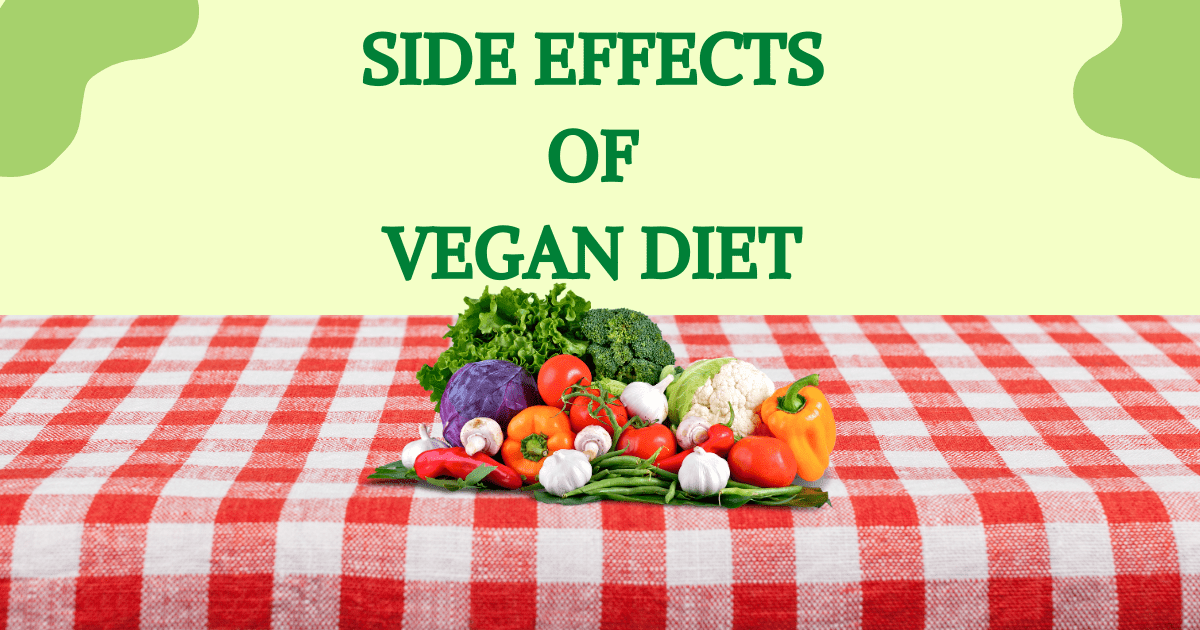The vegan diet has become increasingly popular in recent years, with more and more people choosing to adopt a plant-based lifestyle. This is a dietary decision where no animal products—meat, dairy, or eggs—are consumed. While the vegan diet offers numerous health benefits and is considered more environmentally friendly, it is essential to be aware of potential side effects that can arise from this lifestyle change. By understanding these side effects and learning how to navigate them, you can ensure a smooth and successful transition to a vegan diet.

1. What is a vegan diet?
A vegan diet is a type of vegetarian diet that excludes not only meat but also all animal-derived products. It focuses on consuming plant-based foods such as fruits, vegetables, grains, legumes, nuts, and seeds. Ethics, the environment, and health are major motivators for adopting a vegan lifestyle. By eliminating animal products from their diet, vegans aim to promote animal welfare, reduce their carbon footprint, and improve their overall health.
2. Benefits of a vegan diet:
There are several benefits associated with following a vegan diet. Firstly, it can significantly improve heart health by reducing the risk of heart disease and lowering cholesterol levels. Secondly, a vegan diet is rich in fiber, which promotes healthy digestion and can assist in maintaining a healthy weight. Moreover, plant-based foods are generally lower in calories and saturated fats, making them an excellent choice for weight management. Additionally, a vegan diet is abundant in vitamins, minerals, and antioxidants that support overall well-being and reduce the risk of chronic diseases such as cancer and diabetes.
3. Common misconceptions about the vegan diet:
Despite its many benefits, the vegan diet is often subject to various misconceptions. One common myth is that it is challenging to obtain enough protein on a vegan diet. However, with careful planning and a varied diet, vegans can easily meet their protein needs through plant-based sources such as legumes, tofu, tempeh, and quinoa. Another misconception is that a vegan diet lacks essential nutrients like calcium and vitamin B12. However, there are plenty of plant-based sources of these nutrients, such as fortified plant milks and cereals. By dispelling these misconceptions, it becomes evident that a well-planned vegan diet can provide all the necessary nutrients for a healthy lifestyle.
4. Side effects of the vegan diet:
While the vegan diet offers numerous health benefits, it is crucial to be aware of the potential side effects that can arise from this dietary change. One common side effect is nutrient deficiency, particularly in nutrients like vitamin B12, iron, calcium, and omega-3 fatty acids. These nutrients are predominantly found in animal-derived foods, and vegans may need to supplement or carefully plan their diet to ensure adequate intake. Additionally, some individuals may experience digestive issues such as bloating and gas when transitioning to a vegan diet due to the increased consumption of fiber-rich foods. It is important to gradually increase fiber intake and drink plenty of water to alleviate these symptoms.
5. Surprising side effects of the vegan diet:
In addition to the more commonly known side effects, there are a few surprising side effects that can occur when adopting a vegan diet. One such side effect is increased flatulence. The high fiber content of plant-based foods can lead to increased gas production, which can be uncomfortable and embarrassing for some individuals. However, this side effect tends to diminish over time as the body adjusts to the increased fiber intake. Another surprising side effect is the potential for weight gain. While a vegan diet is often associated with weight loss, it is still possible to consume excess calories from plant-based sources, leading to weight gain if not eaten in moderation. Being mindful of portion sizes and choosing whole, unprocessed foods can help prevent this side effect.
6. Navigating the side effects of the vegan diet:
Experiencing side effects when transitioning to a vegan diet does not mean that it is inherently unhealthy or unsuitable. It simply requires some adjustments and considerations. To navigate the side effects, it is essential to ensure a well-balanced and varied diet that includes a wide range of plant-based foods. This will help to address any potential nutrient deficiencies and provide the body with the necessary vitamins and minerals. Additionally, it is crucial to listen to your body and pay attention to any symptoms or discomfort. If you are experiencing persistent side effects, it may be beneficial to consult a healthcare professional or a registered dietitian who specializes in plant-based diets.
7. How to prevent and manage side effects on a vegan diet:
Preventing and managing side effects on a vegan diet can be achieved through proper planning and attention to nutrient intake. To prevent nutrient deficiencies, it is important to incorporate a variety of plant-based protein sources, such as legumes, tofu, and tempeh, into your diet. Additionally, including fortified plant milks, cereals, and nutritional yeast can help ensure adequate intake of nutrients like calcium and vitamin B12. To manage digestive issues, gradually increase your fiber intake and consume small, frequent meals throughout the day. Staying hydrated and engaging in regular physical activity can also aid in digestion and alleviate any discomfort.
8. Vegan diet tips for beginners:
For those new to the vegan diet, it can be overwhelming to navigate the lifestyle change. Here are a few tips:
- Educate yourself: Familiarize yourself with plant-based protein sources, nutrient-rich foods, and vegan recipes to ensure a balanced and enjoyable diet.
- Meal planning: Plan your meals in advance to ensure you are meeting your nutritional needs and avoiding any potential deficiencies.
- Find support: Connect with other vegans or join online communities to gain support, share experiences, and discover new recipes and resources.
- Experiment with new foods: Accept the chance to experience new flavors and foods made from plants. Be open to trying new recipes and exploring different cuisines.
- Be patient and kind to yourself: Transitioning to a vegan diet takes time and adjustment. Allow yourself room for trial and error, and remember that it’s a journey towards a more compassionate and sustainable lifestyle.
Conclusion
The vegan diet offers numerous health benefits and is a sustainable choice for both the individual and the planet. However, it is important to be aware of the potential side effects that can arise from this lifestyle change. By understanding these side effects and implementing strategies to prevent and manage them, you can successfully navigate the vegan diet and enjoy all the benefits it has to offer. Remember to listen to your body, seek support when needed, and approach the vegan diet with an open mind and a willingness to explore new foods and flavors. With the right knowledge and preparation, the vegan diet can be a fulfilling and rewarding journey towards a healthier and more compassionate lifestyle.
